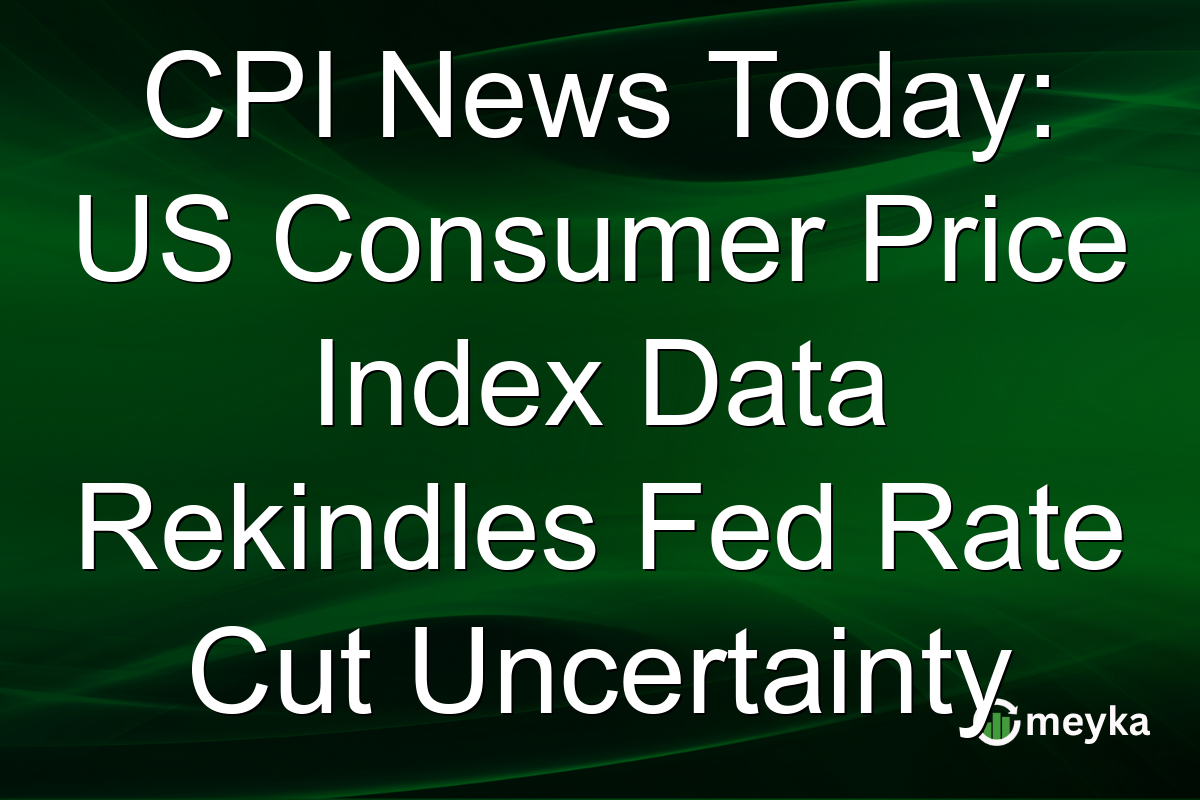CPI News Today: US Consumer Price Index Data Rekindles Fed Rate Cut Uncertainty
The recent release of the US Consumer Price Index (CPI) has sparked discussion among investors and economists alike. The inflation data came in slightly above expectations, reigniting debates on how the Federal Reserve might adjust its policy to address these changes. As the market absorbs today’s CPI report, questions loom about the timing of potential interest rate cuts, crucial for shaping the US economic outlook.
Understanding the Recent CPI Report
Today’s CPI report revealed that consumer prices rose slightly more than analysts had anticipated. The CPI, a critical measure of inflation, climbed 0.4% in August compared to the previous month, edging up the annual inflation rate to 3.7%. This increase has led to renewed speculation about the Federal Reserve’s next moves. Economists had expected only a 0.3% rise, making these figures significant in influencing how monetary policy might evolve. The Federal Reserve closely monitors inflation indicators like the CPI to gauge whether the economy is overheating. When inflation metrics rise unexpectedly, it complicates the path forward for interest rate decisions. The Fed aims for a 2% inflation target to maintain price stability and foster economic growth. Today’s data underscores the ongoing challenges in balancing these objectives.
Implications for Federal Reserve Policy
The slight uptick in the inflation data from the CPI report indicates potential delays in rate cuts by the Federal Reserve. Despite some pressure to ease borrowing costs to support the economy, increasing inflation presents a counterargument for maintaining or even raising current rates. According to CNBC, persistent inflation could lead the Fed to hold off on easing its monetary policy stance. The central bank’s decision will likely depend on upcoming economic data and employment figures. As it stands, investors remain cautious, watching closely for signals from future Fed meetings.
Market Reactions and Investor Concerns
Following the CPI release, market reactions were swift. Stocks reflected apprehension, with investors recalibrating their expectations regarding interest rates. Key indices like the S&P 500 and Nasdaq experienced initial declines as traders processed the implications of the report. As noted by Bloomberg, the inflation data has amplified uncertainty in the market, making investors wary of overly optimistic bets on rate cuts this year. This cautious approach aligns with the mixed economic signals: while growth appears steady, inflationary pressures raise concerns about potential overheating.
Shaping the US Economic Outlook
The latest CPI findings not only influence monetary policy but also pose broader implications for the US economic outlook. As inflation remains a key concern, businesses and consumers face potential changes in spending habits. Higher prices can erode purchasing power and disrupt consumer confidence. According to Reuters, continued price increases across sectors such as energy and housing could drive the Fed to proceed cautiously with any policy changes. The interplay of inflation and monetary policy will be pivotal in determining the trajectory of future economic growth and stability.
Final Thoughts
Today’s CPI report underscores the complexity of the current economic climate. With inflation above expectations, understanding the Federal Reserve’s next steps becomes critical for investors. As we navigate these changes, tools like Meyka can offer valuable insights with its real-time analysis capabilities, helping investors make informed decisions. Staying informed and adaptable remains key in this evolving landscape.
FAQs
The CPI report showed higher-than-expected inflation, suggesting the Fed might delay rate cuts to control inflation, affecting future monetary policy decisions.
The CPI indicates inflation levels. High inflation affects purchasing power and can influence Fed policy on interest rates, impacting investment returns.
Markets reacted with caution. Key indices like the S&P 500 saw declines as investors reassessed the likelihood of near-term rate cuts amid rising inflation concerns.
Disclaimer:
This is for information only, not financial advice. Always do your research.






